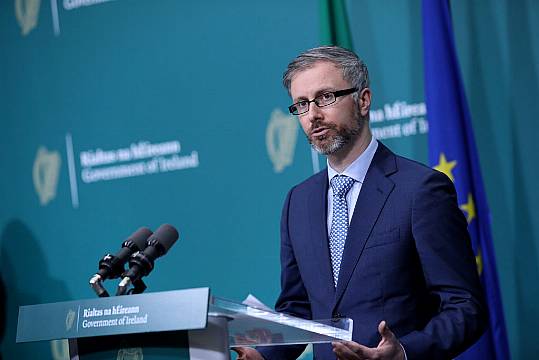Migrant women in Ireland fear speaking out about gender-based violence in case they lose their legal status in the country, a report has found.
An interim report by the independent Anti-Racism Committee called for the removal of all barriers to accessing support for migrant women suffering at the hands of a spouse or partner.
The report, published by Equality Minister Roderic O’Gorman on Wednesday, found that minority women face “an extra and therefore discriminatory burden of additional barriers” in accessing support services.
The report said: “Migrant women whose status is dependent on their spouse fear to report abuse for fear of losing their legal status.
“Access to refuges for women with certain immigration status can be problematic.
Racism is an ongoing and complex problem within society, and I am committed to ensuring that this Government plays a leading role in tackling it.
I'm delighted to publish the Interim Report of the Anti-Racism Committee and look forward to the National Action Plan against Racism. pic.twitter.com/MX3bR4xbUa— Roderic O’Gorman TD (@rodericogorman) April 21, 2021
“While current policy allows for women in abusive relationships to apply for legal residence status independent of their abuser, the guidelines are at ministerial discretion and are not on a statutory footing.
“Clear rules should be developed to ensure that no woman faces additional barriers, or risks jeopardising her status, when seeking refuge.”
The report echoes the findings of the UN’s Committee on the Elimination of Racial Discrimination for Ireland.
In 2019, it said: “The committee is concerned that many migrant women victims of domestic violence whose residency status depends on their abusive spouses, particularly migrant women with irregular status, remain in abusive relationships due to the fear of being deported.
“It is also concerned about the high incidence of domestic, sexual and gender-based violence in direct provision centres.”
Recommendations
The Anti-Racism Committee has made three recommendations which Mr O’Gorman will take as proposals to the Government.
It called for Ireland to remove its reservation to Article 4 of the International Convention on the Elimination of Racial Discrimination, and urges the Government to put in place ethnic equality monitoring across all public services.
It also called for the removal of all barriers to support for migrant women experiencing gender-based violence.
Racism and discrimination still pervade our society
Mr O’Gorman said: “Sadly we know that racism and discrimination still pervade our society, and there is so much more that can be done to tackle it, including by Government.
“Racism is an ongoing and complex problem, the effects of which are felt throughout society, and I am committed to ensuring that this Government plays a leading role in tackling it.
“I look forward to the National Action Plan against Racism that is due later this year, and I will continue to work with the committee as they proceed with this important work.”
Public consultation
On Wednesday the committee launched a public consultation process that will run for 12 weeks, until July 14th, and has invited stakeholders and members of the public to give their views.
This will feed in to the development of the new action plan.
The Anti-Racism Committee is chaired by Caroline Fennell, professor of law at University College Cork and commissioner with the Irish Human Rights and Equality Commission.
She said: “The Anti-Racism Committee is particularly cognisant of the context of the Covid-19 pandemic in which this report is presented, and the differential impact of the pandemic upon migrant workers, those living in direct provision, and members of the Traveller community.
“We are now embarking upon an intensive phase of stakeholder dialogue and consultation as part of the development of a new National Action Plan Against Racism.”
If you have been affected by any of the issues raised in this article, you can contact Women’s Aid (24-hour freephone helpline at 1800 341 900, email helpline@womensaid.ie) or Men’s Aid Ireland (helpline at 01 554 3811, email hello@mensaid.ie).
Safe Ireland also outlines a number of local services and helplines at https://www.safeireland.ie/get-help/where-to-find-help/. In the case of an emergency, always dial 999/112.







